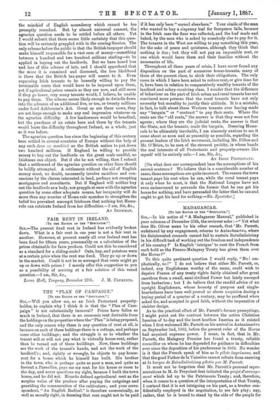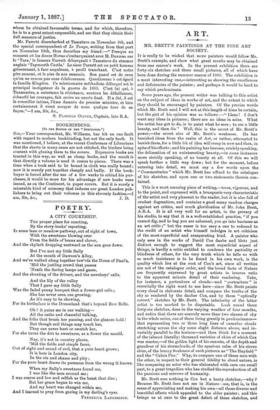MADAGASCAR.
[TO THE EDITOR OP THE "SPECTATOR."] SIR,—In his notice of " A Madagascar Manual," published in your columns of December 25th, the reviewer asks :—" Yet what does Mr. Oliver mean by his other remark, that ' Mr. Parrett, unfettered by any engagement, returns to Antananarivo, where his disinterested counsels cannot fail to sustain Rainilaikriveny in his difficult task of working out the freedom and independence of his country ?' Is English intrigue' to oust the French from such hold as the Franco-Malagasy Treaty has given them over the Hovas ?"
To this quite pertinent question I would reply, "No ! em- phatically, no !" I do not believe that either Mr. Parrett, or, indeed, any Englishman worthy of the name, could wish to deprive France of any treaty rights fairly obtained after great sacrifices from a small, semi-civilised Power but lately emerged from barbarism ; but I do believe that the candid advice of an upright Englishman, whose honesty of purpose and single- heartedness have been well proved as above suspicion during a trying period of a quarter of a century, may be proffered when asked for, and accepted in good faith, without the imputation of sinister design.
As to the practical effect of Mr. Parrett's former promptings, I might point out the contrast between the active Christian Imerina of to-day and the inert heathen Imerina as it existed when I first welcomed Mr. Parrett on his arrival in Antananarivo on September 2nd, 1862, before the present ruler of the Hovas had acquired supreme power. I mean, in fact, that in Mr. Parrett, the Malagasy Premier has found a trusty, reliable councillor on whom he has depended for guidance in difficulties ever since the deposition of his predecessor in 1864. No wonder is it that the French speak of him as is pilots imprimeur, and that the good Father de la Vaissiere cannot refrain from sneering at la barque de Rainilaiarivbny pilotee par M. Parrett.
It must not be forgotten that Mr. Parrett's personal repre- sentations to M. de Freycinet first initiated the projet d'arraruje- ment which led up to the Patrimonio Treaty; and, therefore, when it comes to a question of the interpretation of that Treaty, I contend that it is not intriguing on his part, as a trustee con- fidentially employed in the negotiation, to see fair play ; nay, rather, that he is bound to stand by the side of the people for
whom he obtained favourable terms, and for which, therefore, he is to a great extent responsible, and see that they obtain their full measure of justice.
Mr. Parrett disembarked at Tamatave on November 6th, and the special correspondent of Le Temps, writing from that port on November 19th, thus describes my friend :—" Presque an moment oh lea douze Hovas s'embarquaient area M. Danmas sur le Tarn,' le fameux Parrett dhbarquait It Tamatave de steamer anglais Taymouth Castle.' Le sieur Parrett est un petit homme grissonnant, a face angulense, It profil trenchant. C'est notre pire ennemi, et le pire de nos ennemis. Son pass6 est de cenx qu'on ne remne pas sans hclaboussure. Qaestionnez 3 cet hgard la famille Kingdon. Ce missionnaire m4thodiste dhfroque est le principal instigateur de la guerre de 1883. C'est Mi qui, It Tananarive, a entretenu la r4sistance, soutenu les dhfaillances, 4chauffe les conrages, fait croire an succes final. H a 6th, it est le conseiller intime, l'ame damnee du premier ministre, et bien certainement it vient essayer de nous quelque tour de ea facon."—I am, Sir, &c.,
S. PASFIELD OLIVER, Captain, late R.A.















































 Previous page
Previous page